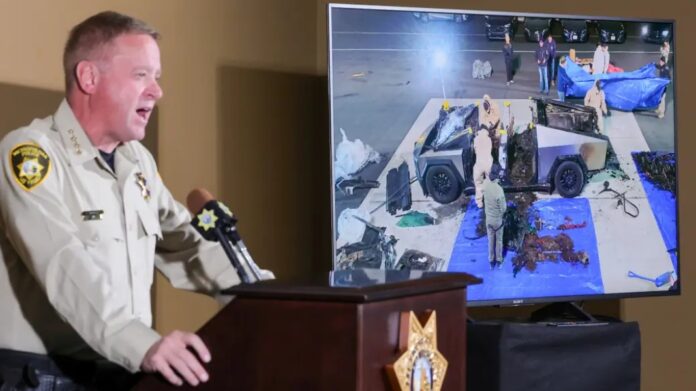In a cold New Year’s Day incident, an explosion in a Tesla Cybertruck outside the Trump International Hotel in Las Vegas highlighted potential misuse of AI tools such as ChatGPT. Officials identified the suspect to be Matthew Livelsberger, 37, of Colorado Springs. Livelberegr was an active-duty Army soldier who used ChatGPT to plan the blast. According to reports, it is the first known incident in the United States of an AI being used for the manufacture of explosive devices.
Planning with AI
Sheriff Kevin McMahill of the Las Vegas Metropolitan Police revealed that Livelsberger used ChatGPT to determine the quantity of explosives required for the attack. Although OpenAI, the developer of the chatbot, claims its models are designed to refuse dangerous instructions, the suspect allegedly accessed publicly available information and disregarded warnings from the AI.

OpenAI has remained committed to responsible AI use, declaring that its tools are designed to discourage illegal or harmful activities. Critics argue that even restricted AI tools can inadvertently aid malicious actors when combined with broader internet data.
Background of the Incident
The authorities further confirmed that the attack was indeed a solo attack by Livelsberger and claimed the explosion was a suicide attempt associated with PTSD. The incident left seven people injured and caused huge destruction, which officials clarified was not politically driven.
Read More: Tesla is Preparing for Big Product Launches in 2025
The FBI also assuaged fears of a wider threat, saying that there was no connection between this attack and a truck attack in New Orleans. Livelsberger’s phone had a six-page manifesto that investigators are examining for insight into his motivations.
Implications for AI and Security
The Las Vegas Cybertruck explosion has brought to the fore growing concerns about the dual-use nature of AI technology. While ChatGPT and similar tools are touted for their innovative applications, this incident brings to the fore the harmful potential of them.
Security experts warn that as AI becomes increasingly accessible, it could inadvertently empower individuals with malicious intent. This event adds urgency to ongoing discussions about regulating AI and implementing safeguards to prevent misuse.

A Wake-Up Call
The tragic incident serves as a stark reminder of the ethical challenges surrounding AI’s rapid adoption. As authorities investigate further, the spotlight remains on how to balance technological innovation with the imperative to ensure public safety.
AI’s future, as both a tool for good and a potential risk, demands vigilant oversight and responsible development.
Stay tuned to Brandsynario for latest news and updates









































